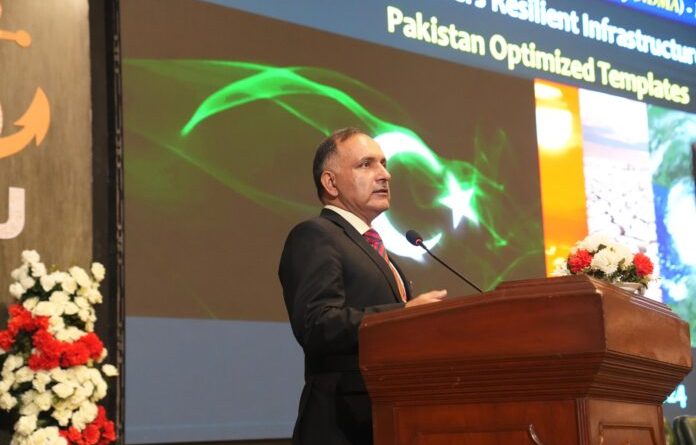Pakistan should embrace materials suited to environment: Gen Inam
ISLAMABAD: Chairman, National Disaster Management Authority (NDMA), Lieutenant General, Inam Haider Malik on Monday said Pakistan should embrace not only traditional infrastructure but also materials suited to the country’s environment.
The National Disaster Management Authority (NDMA) hosted a seminar focused on “Disaster Resilient Infrastructure,” in collaboration with Bahria University, aiming to address the pressing need for climate adaptation and infrastructure resilience in Pakistan.
Chairman NDMA, Lieutenant General Inam Haider Malik led discussions on the country’s preparedness for future disasters, highlighting the critical threats posed by climate change and the steps being taken to mitigate its impact.
“Resilience won’t come solely from the type of construction but from adapting to what we have,” he emphasized. He lauded NDMA’s technological efforts, including simulations of the 2022 floods and advanced weather forecasting, noting that “technology today can not only address present needs but future ones as well.”
In his keynote address, Lieutenant General Malik warned that if global temperatures exceed the 1.5°C threshold, countries like Pakistan would face unprecedented climatic disasters. “From glacial melting to recurring floods, we are already witnessing severe climate impacts,” he said. He cited the 2022 floods, which caused massive devastation, with over 8,000 miles of roads and 480 bridges damaged, leading to significant economic losses. Recovery and rehabilitation remain ongoing challenges.
The seminar featured experts from various fields, all underlining the importance of infrastructure resilience in combating climate change. Dr. Shafqat Munir, Deputy Executive Director at the Sustainable Development Policy Institute (SDPI), pointed out that it is not the disasters themselves but inappropriate infrastructure that leads to high mortality. “Pakistan is one of the ten countries most impacted by climate change. Unplanned development, deforestation, and pollution are aggravating these crises,” he said. Drawing comparisons, he highlighted how community preparedness in the Philippines has helped them manage frequent cyclones and floods more effectively.
Munir further urged the need for integrating Disaster Risk Reduction (DRR) into development plans and addressing governance issues. He identified five major impacts of disasters: economic, physical, human, social, and environmental capital, noting that “Pakistan loses 23% of its GDP annually due to disasters.”
Prof. Engineer Dr. Azam Khan of NUST stressed the urgent need for a comprehensive infrastructure inventory in Pakistan. “Pakistan is located at the confluence of three tectonic plates, making it highly vulnerable to earthquakes. Poor construction materials and a lack of supervision exacerbate the damage even during minor quakes,” he explained. He called for a region-specific data approach to develop earthquake-resilient infrastructure.
Similarly, Engineer Tahir Shamshad, former Vice President of NESPAK, shared lessons from the 2005 earthquake. “We helped rebuild over 600,000 homes, and it became a UN-recognized project,” he said. However, he lamented the lack of proper training for labor in Pakistan, noting that while the country has a global demand for 600,000 laborers, most are unable to meet international standards due to poor training.
Brig. Dr. Adeel Zafar, Head of Structural Engineering at NUST, presented cutting-edge technologies that can aid in disaster resilience, such as predictive modeling using AI, steel-fiber reinforced concrete, and retrofitting using carbon fiber-reinforced plastics. “Universities play a critical role in developing local knowledge and technical research that aligns with our challenges,” he noted.
Digital transformation, modular construction, and nature-based solutions were highlighted by Dr. Zain Saeed as key strategies in developing future-proof infrastructure. “We must adopt innovative and adaptive solutions, with investments in research and development,” he said, emphasizing that resilient infrastructure is not just robust but flexible enough to withstand growing challenges.
Engineer Asad Mehmood stressed the importance of community ownership in building resilient infrastructure. Citing Japanese models, he identified “man, material, machinery, method, and money” as key components. “Policy harmony at the national level is crucial to tap into global funding. Without local community involvement, no project will succeed,” he warned.
The seminar concluded with a commitment from NDMA and its partners to continue focusing on strengthening infrastructure resilience in Pakistan. “We must ensure that our solutions are drawn from the environment and tailored to our unique challenges,” said Malik, calling for multi-sectoral collaboration to make Pakistan more resilient to future disasters.

